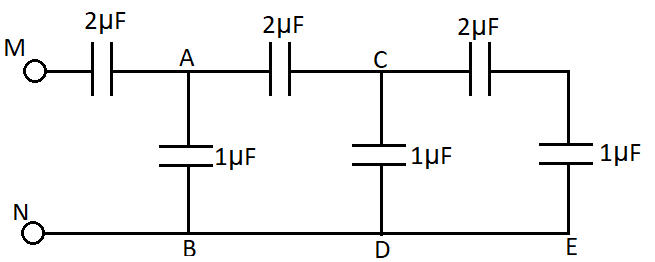Question
Question: Find the equivalent capacitance between M and N 
Solution
To solve this we need to use the formula for the equivalent capacitances for the capacitances arranged in series or in parallel combination. So first we need to find the equivalent between the last 2 capacitors in series, which is parallel to the 1μF. The equivalent of these will be in series with the 2μF and parallel with 1μF again. Finally the whole equivalent capacitance will be in series with 2μF.
Formula used: In this solution we will be using the following formula,
⇒Ceq=C1+C2+C3+.... where Ceq is the equivalent capacitance when the capacitances are placed in parallel.
And Ceq1=C11+C21+C31+.... where Ceq is the equivalent capacitance when the capacitances are placed in a series circuit.
Complete step by step answer:
To find the equivalent capacitance first let us name the various points in the figure given above as,

Now in between the points C and E we have 2 capacitances which are placed in series. So the equivalent capacitance between them will be given by the formula,
⇒Ceq1=C11+C21+C31+....
here we substitute C1=2μF and C2=1μF
So substituting the values we get,
⇒Ceq11=21+11
Taking the LCM as 2 ,
⇒Ceq11=21+2
So we take the reciprocal on both the sides we get,
⇒Ceq1=32μF
Now between the points C and D Ceq1 and 1μF are in parallel. So the equivalent capacitance is given by the formula,
⇒Ceq=C1+C2+C3+....
So substituting C1=Ceq1=32μF and C2=1μF
Therefore, we get
⇒Ceq2=32+1
Taking LCM as 3,
⇒Ceq2=32+3
Hence the value of the equivalent resistance between C and D is Ceq2=35μF
This capacitance is in series with 2μF between A and D.
Therefore again, C1=Ceq2=35μF and C2=2μF
So we get substituting in Ceq1=C11+C21+C31+....
⇒Ceq31=53+21
Taking LCM as 10 we get,
⇒Ceq31=106+5
Taking the reciprocal we get,
⇒Ceq3=1110μF
This capacitance is in parallel with 1μF between points A and B. So we get from the formula Ceq=C1+C2+C3+....,
⇒Ceq4=1110+1
Taking LCM as 11,
⇒Ceq4=1110+11
Hence we get,
⇒Ceq4=1121μF
So between the points M and N the equivalent capacitance is given by the series of ⇒Ceq4=1121μF and 2μF. So substituting the values in the formula, Ceq1=C11+C21+C31+....
⇒Ceq1=2111+21
Taking LCM as 21
⇒Ceq1=4222+21
So taking reciprocal we get
⇒Ceq=4342μF
So this is the equivalent capacitance between the points M and N is Ceq=4342μF.
Note:
When the capacitors are in parallel, then the total charge that is stored on all the plates is the sum of the charges that is stored on the individual plates. When the capacitors are in series, then the sum of the potential drop for each capacitor will give the total voltage across the circuit.
